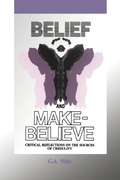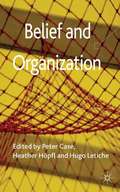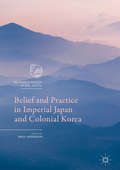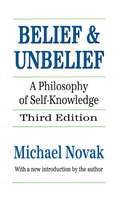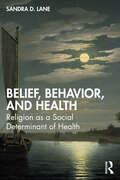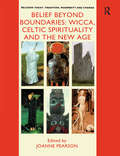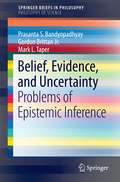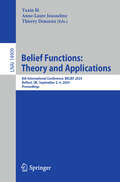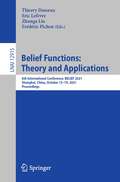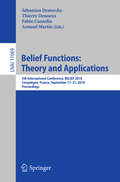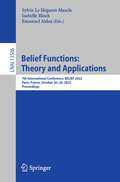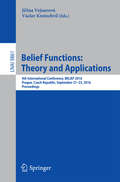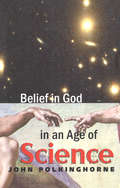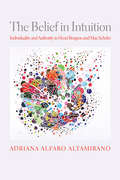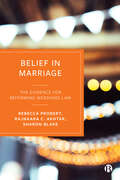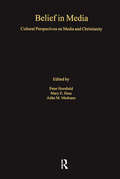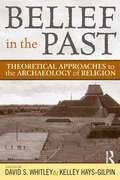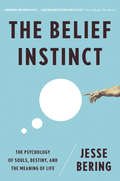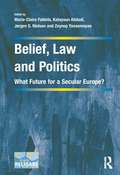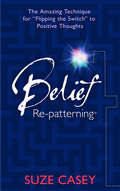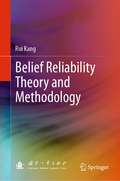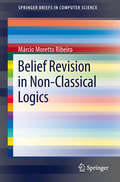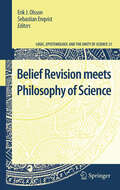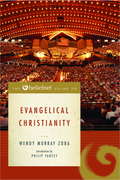- Table View
- List View
Belief and Make-Believe
by George Albert WellsWhy do so many people - sometimes even intelligent people - swallow the preposterous claims of religion? G.A. Wells, the leading freethinker of our time, tries to shed light on this puzzle in his entertaining and enormously learned book, Belief and Make-Believe.Professor Wells begins by analyzing the nature of belief. To dispel popular confusions on the relation between words and thoughts, he compares the thinking process of scientists, laymen, and chimpanzees.The power of emotion and instinct to help form people's ideological outlooks is analyzed by preference to "defiance" and "reliance", polar attitudes which arise from the need for dominance and submission in primate groups. Wells shows the influence of defiance and reliance in patriotism and in monotheistic religions, where submission to the will of the omnipotent is a wonderful technique for feeling secure in the face of life's actual and ineradicable dangers.Since the knowledgeable Christians now accept that the Bible is uneven, unreliable, and sometimes morally abhorrent, and that the New Testament account of the origin of Christianity is mostly legend, various attempts have been made to save something from the debris by selective re-interpretation. Wells evaluates several typical examples, showing how the apologists shrink from the clear implications of their arguments, which would demolish the whole edifice of Christian doctrine.Finally, Professor Wells debunks some of the extravagant and mystical claims that have been made for the arts, notably poetry, as quasi-religious vehicles for gaining insights into the human condition.
Belief and Organization
by Peter Case Heather Höpfl Hugo LeticheExamines the alternative belief systems which contemporary organizational actors live by and through which they seek to find meaning within the dominant (neo)capitalist social order. This volume marks an attempt to move the study of belief forward within management and organization studies.
Belief and Practice in Imperial Japan and Colonial Korea (Religion and Society in Asia Pacific)
by Emily AndersonBringing together the work of leading scholars of religion in imperial Japan and colonial Korea, this collection addresses the complex ways in which religion served as a site of contestation and negotiation among different groups, including the Korean Choson court, the Japanese colonial government, representatives of different religions, and Korean and Japanese societies. It considers the complex religious landscape as well as the intersection of historical and political contexts that shaped the religious beliefs and practices of imperial and colonial subjects, offering a constructive contribution to contemporary conflicts that are rooted in a contested understanding of a complex and painful past and the unresolved history of Japan's colonial and imperial presence in Asia. Religion is a critical aspect of the current controversies and their historical contexts. Examining the complex and diverse ways that the state, and Japanese and colonial subjects negotiated religious policies, practices, and ministries in an attempt to delineate these "imperial relationships", this cutting edge text sheds considerable light on the precedents to current sources of tension.
Belief and Unbelief: A Philosophy of Self-knowledge
by Michael NovakThis is perhaps the most widely read of Michael Novak's books. Belief and Unbelief attempts to push intelligence and articulation as far as possible into the stuff of what so many philosophers set aside as subjectivity. It is an impassioned critique of the idea of an unbridgeable gap between the emotive and the cognitive � and in its own way, represents a major thrust at positivist analysis.Written in a context of personal tragedy as well as intellectual search, the book is grounded in the belief that human experience is enclosed within a person to person relationship with the source of all things � sometimes in darkness, other tunes in aridity, but always in deep encounter with community and courage. It is written with a deep fidelity to classical Catholic thought as well as a sense of the writings of sociology, anthropology, and political theory�from Harold Lasswell to Friedrich von Hayek.This third edition includes Novak's brilliant 1961 article "God in the Colleges" from Harper's � a critique of the technification of university life that rules issues of love, death, and personal destiny out of bounds, and hence leaves aside the mysteries of contingency and risk, in favor of the certainties of research, production, and consumption. For such a "lost generation" Belief and Unbelief will remain of tremendous interest and impact.When the book first appeared thirty years ago, it was praised by naturalists and religious thinkers alike. Sidney Hook called it "a remarkable book, written with verve and distinction." James Collins termed it "a lively and valuable essay from which a reflective, religiously concerned reader can draw immense profit." And The Washington Post reviewer claimed that "Novak has written a rich, relentlessly honest introduction to the problem of belief. It is a deeply personal book, rigorous in argument and open ended in conclusions."
Belief, Behavior, and Health: Religion as a Social Determinant of Health
by Sandra D. LaneThis book uniquely examines, across cultures, the health benefits and detriments of religious beliefs, with important implications for individual wellbeing and human survival.Belief, Behavior, and Health takes the reader through journeys of the author’s research in the Middle East, Africa, and the urban United States, where she focused on the unequal health and survival of women globally and vulnerable groups in the United States. Almost every health problem, especially those experienced by the poor and disadvantaged, arose from or was made worse by the conditions in the environment in which people lived. Lane’s detailed studies of beliefs about Judaism, Christianity, and Islam led to the author’s deep observations on how religious belief and practice, as well as discrimination due to religious prejudice, can be a major influence on health, both positively and negatively. In this book, Lane shows how religious precepts and cultural influences on religious behavior function as social determinants of health. An accessible and compelling read, this book will appeal to students and scholars of public health, anthropology, and sociology and those interested in the influence of religion on health outcomes.
Belief Beyond Boundaries: Volume 5 (Religion Today: Tradition, Modernity And Change Ser. #Vol. 5)
by Joanne PearsonBelief Beyond Boundaries explores 'religions' or forms of spirituality that tend to be marginal to the mainstream of British and North American religious expression. The book examines how alternative spiritualities traditionally classed as 'New Age' or new religious movements have grown exponentially in recent years. It progresses to detailed examination of Paganism, Celtic spirituality, Wicca, witchcraft, North American indigenous religion and New Age, considering the impact of the rise of science on religion and the emergence of new categories of spirituality. The authors explore why these forms of spirituality are so popular in the contemporary UK and USA, and how they impact on mainstream traditions. The five textbooks and Reader that make up the Religion Today Open University/Ashgate series are: o From Sacred Text to Internet o Religion and Social Transformations o Perspectives on Civil Religion o Global Religious Movements in Regional Context o Belief Beyond Boundaries o Religion Today: A Reader
Belief, Evidence, and Uncertainty: Problems of Epistemic Inference (SpringerBriefs in Philosophy #0)
by Prasanta S. Bandyopadhyay Gordon Brittan Jr. Mark L. TaperThis work breaks new ground by carefully distinguishing the concepts of belief, confirmation, and evidence and then integrating them into a better understanding of personal and scientific epistemologies. It outlines a probabilistic framework in which subjective features of personal knowledge and objective features of public knowledge have their true place. It also discusses the bearings of some statistical theorems on both formal and traditional epistemologies while showing how some of the existing paradoxes in both can be resolved with the help of this framework. This book has two central aims: First, to make precise a distinction between the concepts of confirmation and evidence and to argue that failure to recognize this distinction is the source of certain otherwise intractable epistemological problems. The second goal is to demonstrate to philosophers the fundamental importance of statistical and probabilistic methods, at stake in the uncertain conditions in which for the most part we lead our lives, not simply to inferential practice in science, where they are now standard, but to epistemic inference in other contexts as well. Although the argument is rigorous, it is also accessible. No technical knowledge beyond the rudiments of probability theory, arithmetic, and algebra is presupposed, otherwise unfamiliar terms are always defined and a number of concrete examples are given. At the same time, fresh analyses are offered with a discussion of statistical and epistemic reasoning by philosophers. This book will also be of interest to scientists and statisticians looking for a larger view of their own inferential techniques. The book concludes with a technical appendix which introduces an evidential approach to multi-model inference as an alternative to Bayesian model averaging.
Belief Functions: 8th International Conference, BELIEF 2024, Belfast, UK, September 2–4, 2024, Proceedings (Lecture Notes in Computer Science #14909)
by Yaxin Bi Thierry Denoeux Anne-Laure JousselmeThis book constitutes the refereed proceedings of the 8th International Conference on Belief Functions, BELIEF 2024, held in Belfast, UK, in September 2–4, 2024. The 30 full papers presented in this book were carefully selected and reviewed from 36 submissions. The papers cover a wide range on theoretical aspects on Machine learning; Statistical inference; Information fusion and optimization; Measures of uncertainty, conflict and distances; Continuous belief functions, logics, computation.
Belief Functions: 6th International Conference, BELIEF 2021, Shanghai, China, October 15–19, 2021, Proceedings (Lecture Notes in Computer Science #12915)
by Thierry Denœux Eric Lefèvre Zhunga Liu Frédéric PichonThis book constitutes the refereed proceedings of the 6th International Conference on Belief Functions, BELIEF 2021, held in Shanghai, China, in October 2021. The 30 full papers presented in this book were carefully selected and reviewed from 37 submissions. The papers cover a wide range on theoretical aspects on mathematical foundations, statistical inference as well as on applications in various areas including classification, clustering, data fusion, image processing, and much more.
Belief Functions: 5th International Conference, BELIEF 2018, Compiègne, France, September 17-21, 2018, Proceedings (Lecture Notes in Computer Science #11069)
by Sébastien Destercke Thierry Denoeux Fabio Cuzzolin Arnaud MartinThis book constitutes the refereed proceedings of the 5th International Conference on Belief Functions, BELIEF 2018, held in Compiègne, France, in September 2018.The 33 revised regular papers presented in this book were carefully selected and reviewed from 73 submissions. The papers were solicited on theoretical aspects (including for example statistical inference, mathematical foundations, continuous belief functions) as well as on applications in various areas including classification, statistics, data fusion, network analysis and intelligent vehicles.
Belief Functions: 7th International Conference, BELIEF 2022, Paris, France, October 26–28, 2022, Proceedings (Lecture Notes in Computer Science #13506)
by Sylvie Le Hégarat-Mascle Isabelle Bloch Emanuel AldeaThis book constitutes the refereed proceedings of the 7th International Conference on Belief Functions, BELIEF 2022, held in Paris, France, in October 2022.The theory of belief functions is now well established as a general framework for reasoning with uncertainty, and has well-understood connections to other frameworks such as probability, possibility, and imprecise probability theories. It has been applied in diverse areas such as machine learning, information fusion, and pattern recognition. The 29 full papers presented in this book were carefully selected and reviewed from 31 submissions. The papers cover a wide range on theoretical aspects on mathematical foundations, statistical inference as well as on applications in various areas including classification, clustering, data fusion, image processing, and much more.
Belief Functions: 4th International Conference, BELIEF 2016, Prague, Czech Republic, September 21-23, 2016, Proceedings (Lecture Notes in Computer Science #9861)
by Jiřina Vejnarová Václav KratochvílThis book constitutes the thoroughly refereed proceedings of the 4th International Conference on Belief Functions, BELIEF 2016, held in Prague, Czech Republic, in September 2016. The 25 revised full papers presented in this book were carefully selected and reviewed from 33 submissions. The papers describe recent developments of theoretical issues and applications in various areas such as combination rules; conflict management; generalized information theory; image processing; material sciences; navigation.
Belief in God in an Age of Science
by John PolkinghorneJohn Polkinghorne is a major figure in today's debates over the compatibility of science and religion. Internationally known as both a theoretical physicist and a theologian-the only ordained member of the Royal Society-Polkinghorne brings unique qualifications to his inquiry into the possibilities of believing in God in an age of science. In this thought-provoking book, the author focuses on the collegiality between science and theology, contending that these "intellectual cousins" are both concerned with interpreted experience and with the quest for truth about reality. He argues eloquently that scientific and theological inquiries are parallel.The book begins with a discussion of what belief in God can mean in our times. Polkinghorne explores a new natural theology and emphasizes the importance of moral and aesthetic experience and the human intuition of value and hope. In other chapters, he compares science's struggle to understand the nature of light with Christian theology's struggle to understand the nature of Christ. He addresses the question, Does God act in the physical world? And he extends his ideas about the role of chaos theory, surveys the prospects for future dialogue between scientific and theological thinkers, and defends a critical realist understanding of the activities of both disciplines. Polkinghorne concludes with a consideration of the nature of mathematical truths and the links between the complementary realities of physical and mental experience.
The Belief in Intuition: Individuality and Authority in Henri Bergson and Max Scheler (Intellectual History of the Modern Age)
by Adriana Alfaro AltamiranoWithin the Western tradition, it was the philosophers Henri Bergson and Max Scheler who laid out and explored the nonrational power of "intuition" at work in human beings that plays a key role in orienting their thinking and action within the world. As author Adriana Alfaro Altamirano notes, Bergon's and Scheler's philosophical explorations, which paralleled similar developments by other modernist writers, artists, and political actors of the early twentieth century, can yield fruitful insights into the ideas and passions that animate politics in our own time.The Belief in Intuition shows that intuition (as Bergson and Scheler understood it) leads, first and foremost, to a conception of freedom that is especially suited for dealing with hierarchy, uncertainty, and alterity. Such a conception of freedom is grounded in a sense of individuality that remains true to its "inner multiplicity," thus providing a distinct contrast to and critique of the liberal notion of the self.Focusing on the complex inner lives that drive human action, as Bergson and Scheler did, leads us to appreciate the moral and empirical limits of liberal devices that mean to regulate our actions "from the outside." Such devices, like the law, may not only carry pernicious effects for freedom but, more troublingly, oftentimes "erase their traces," concealing the very ways in which they are detrimental to a richer experience of subjectivity.According to Alfaro Altamirano, Bergson's and Scheler's conception of intuition and personal authority puts contemporary discussions about populism in a different light: It shows that liberalism would only at its own peril deny the anthropological, moral, and political importance of the bearers of charismatic authority. Personal authority thus understood relies on a dense, but elusive, notion of personality, for which personal authority is not only consistent with freedom, but even contributes to it in decisive ways.
Belief in Marriage: The Evidence for Reforming Weddings Law
by Rebecca Probert Rajnaara C. Akhtar Sharon BlakeEPDF and EPUB available Open Access under CC-BY-NC-ND licence. In principle, couples getting married in England and Wales can choose to do so in a way that reflects their beliefs. In practice, the possibility of doing so varies considerably depending on the religious or non-religious beliefs they hold. To demonstrate this divergence, this book draws on the accounts of 170 individuals who had, or led, a wedding ceremony outside the legal framework. The authors examine what these ceremonies can tell us about how couples want to marry, and what aspects of the current law preclude them from doing so. This new evidence shows how the current law does not reflect social understandings of what makes a wedding meaningful. As recommended by the Law Commission, reform is urgently needed.
Belief in Media: Cultural Perspectives on Media and Christianity
by Mary E. HessMost works on media developments and Christianity approach the subject from the perspective of the implications of new media technologies for traditional Christian practices or how churches can use new media to further their goals. The common framework of analysis is a 'given reality' of traditional institutional Christianity and how it interacts with, affects and is affected by media. Media are treated as a separate cultural reality. This book presents, in an accessible form, the new directions that approach the interaction of media and religion from a cultural perspective, and illustrates these new directions by a number of international and intercultural case studies and explorations. Looking at how global media are constructing cultural forms, structures and processes, the authors show how these have become the life out of which individual and social meaning is created and practised. Examining how individuals create religious meaning by interacting with media of various kinds, crossing boundaries of traditional religious cultures and contemporary media cultures, this book reveals how Christian institutions are also defined in the process of living culturally within their broader media context.
Belief in the Past: Theoretical Approaches to the Archaeology of Religion
by David S. Whitley Kelley Hays-GilpinHuman actions are often deeply intertwined with religion and can be understood in a strictly religious context. Yet, many volumes and articles pertaining to discussions of religion in the archaeological past have focused primarily on the sociopolitical implications of such remains. The authors in this volume argue that while these interpretations certainly have a meaningful place in understanding the human past, they provide only part of the picture. Because strictly religious contexts have often been ignored, this has resulted in an incomplete assessment of religious behavior in the past. This volume considers exciting new directions for considering an archaeology of religion, offering examples from theory, tangible archaeological remains, and ethnography.
The Belief Instinct: The Psychology of Souls, Destiny, and the Meaning of Life
by Jesse BeringTop 25 Books of 2011 by the American Library Association, Choice Reviews Named one of the 11 Best Psychology Books of 2011 by The Atlantic "A balanced and considered approach to this often inflammatory topic." --Nature Lively and brilliantly argued, The Belief Instinct explains the psychology behind belief. Drawing on surprising new studies as well as on literature, philosophy, and even pop culture, The Belief Instinct will reward readers with an enlightened understanding of belief--as well as the tools to break free of it.
Belief, Law and Politics: What Future for a Secular Europe? (Cultural Diversity and Law in Association with RELIGARE)
by Marie-Claire Foblets Jørgen S. Nielsen Katayoun Alidadi Zeynep YanasmayanThis edited collection gathers together the principal findings of the three-year RELIGARE project, which dealt with the question of religious and philosophical diversity in European law. Specifically, it covers four spheres of public policy and legislation where the pressure to accommodate religious diversity has been most strongly felt in Europe: employment, family life, use of public space and state support mechanisms. Embracing a forward-looking approach, the final RELIGARE report provides recommendations to governance units at the local, national and European levels regarding issues of religious pluralism and secularism. This volume adds context and critique to those recommendations and more generally opens an intellectual discussion on the topic of religion in the European Union. The book consists of two main parts: the first includes the principal findings of the RELIGARE research project, while the second is a compilation of 28 short contributions from influential scholars, legal practitioners, policy makers and activists who respond to the report and offer their views on the sensitive issue of religious diversity and the law in Europe.
Belief Re-patterning: The Amazing Technique For Flipping The Switch To Positive Thoughts
by Suze CaseyTired of beating yourself up for not living what you know to be true? Ready to light your passions and let them fuel your dreams and desires? What if you could reset old thought patterns, "flipping the switch" without thinking about it? What if there was an autopilot option for positive thinking? There is, and you can access it through Belief Re-patterning! Solidly based in cognitive learning theory, educational psychology, and years of observation, this proactive technique developed by author and teacher Suze Casey rebuilds neural pathways and connections, allowing you to think, act, and feel differently. You didn’t arrive with an owner’s manual for your mind; and neither did your parents, friends, or children. Well, Belief Re-patterningcan be just what you’re looking for—full of activities that acknowledge your Inner Critic, strengthen your Inner Coach, and ignite your inner motivation. You’re going to have a conversation with yourself; it might as well be compassionate, encouraging, conscious, supportive, purposeful, and authentic! In this book, you’ll discover guaranteed ways to quickly, and almost effortlessly, get back on track when life’s stressors have pulled you off.
Belief Reliability Theory and Methodology
by Rui KangThis book, from the perspective of reliability science construction, proposes a new theory called BELIEF RELIABILITY theory on the basis of probability theory, uncertainty theory and chance theory. The main topics include the philosophical basis of reliability science, the principles of reliability science, the criteria of reasonable reliability metrics and the basic theoretical framework and methodology of belief reliability theory. In this book, the belief reliability metric, analysis, design and evaluation methods will provide readers with a brand-new perspective on reliability applications and uncertainty quantification.
Belief Revision in Non-Classical Logics (SpringerBriefs in Computer Science)
by Márcio Moretto RibeiroSince the advent of the Semantic Web, interest in the dynamics of ontologies (ontology evolution) has grown significantly. Belief revision presents a good theoretical framework for dealing with this problem; however, classical belief revision is not well suited for logics such as Description Logics. Belief Revision in Non-Classical Logics presents a framework which can be applied to a wide class of logics that include - besides most Description Logics such as the ones behind OWL - Horn Logic and Intuitionistic logic, amongst others. The author also presents algorithms for the most important constructions in belief bases. Researchers and practitioners in theoretical computing will find this an invaluable resource.
Belief Revision meets Philosophy of Science (Logic, Epistemology, and the Unity of Science #21)
by Sebastian Enqvist Erik J OlssonBelief revision theory and philosophy of science both aspire to shed light on the dynamics of knowledge - on how our view of the world changes (typically) in the light of new evidence. Yet these two areas of research have long seemed strangely detached from each other, as witnessed by the small number of cross-references and researchers working in both domains. One may speculate as to what has brought about this surprising, and perhaps unfortunate, state of affairs. One factor may be that while belief revision theory has traditionally been pursued in a bottom- up manner, focusing on the endeavors of single inquirers, philosophers of science, inspired by logical empiricism, have tended to be more interested in science as a multi-agent or agent-independent phenomenon.
Belief Systems and the Perception of Reality
by Bastiaan Dr Rutjens Mark Dr BrandtThis book focuses on the social psychology of belief systems and how they influence perceptions of reality. These belief systems, from politics to religion to science, not only shape one’s thoughts and views but also can be the cause of conflict and disagreement over values, particularly when they are enacted in political policies. In Belief Systems and the Perceptions of Reality, editors Bastiaan T. Rutjens and Mark J. Brandt examine the social psychological effects at the heart of the conflict by bringing together contributions under five themes: motivated reasoning, inequality, threat, scientists interpreting science, and people interpreting science. This book aims to create a more integrated understanding of reality perception and its connection with belief systems, viewed through the lens of social psychology. The synthesis of expert contributors as well as the literature around social psychology and belief systems makes this a unique resource for students, researchers and academics in behavioural and social sciences as well as activists and journalists working in this political field.
The Beliefnet Guide to Evangelical Christianity
by Wendy Murray ZobaThe inaugural volume in a new series created in partnership with Beliefnet, today's leading religion and spirituality web site. This attractively priced, compact guide explains the essentials of historical and contemporary evangelicalism.
